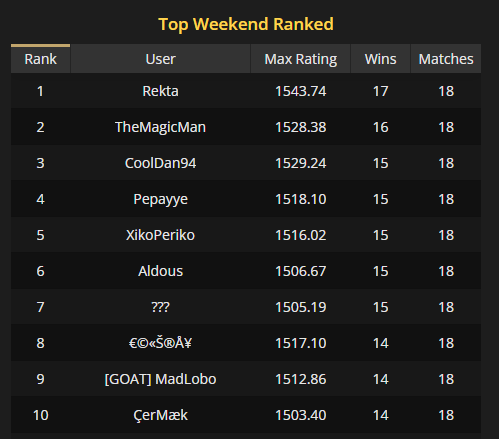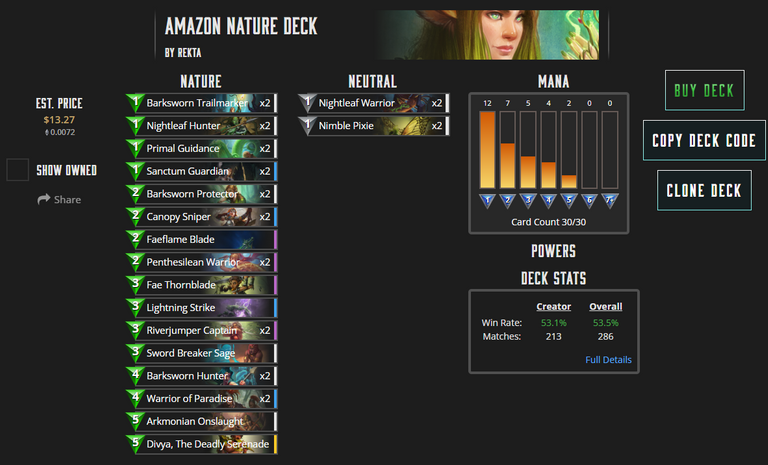¿Gods Unchained ignora a los jugadores 'free-to-play'? || Gods Unchained ignores free-to-play players?



Creo que la competitividad es un factor que va más allá de la diversión. Algunos relacionan el escenario competitivo como algo adversamente proporcional a lo divertido, pero para mí es este primer aspecto una evolución del segundo y, particularmente en videojuegos, llega a ser tan importante que sin la posibilidad de ser competitivo, solo por el mérito propio y el eventual factor suerte, dicho juego carece de diversión y, paulatinamente, muere. Entendiendo esto, ser "amigable" con el jugador free-to-play cobra importancia también.
Es fácil entender que, si quieres que alguien gaste algo más que tiempo en tu producto, muy probablemente primero tengas que hacer que le guste y en consecuencia consuma más de dicho producto con alguna intervención económica solo porque genuinamente quiere hacerlo. "Obligar" a gastar termina convirtiéndose en un veneno que aleja a cualquier posible cliente, además de que ahuyenta a los ya establecidos. Puede que te sirva por algún tiempo, o con unas pocas personas. Sin embargo, al final, el resultado siempre será el mismo: otro juego muerto. Esta es una circunstancia que, por lo menos en el último año, los responsables detrás de Gods Unchained parecen ignorar por completo.
Es ese camino que Gods Unchained sigue actualmente una despreciable ruta que lo lleva paso a paso hacia el precipicio del olvido. Para ser lo más claro posible, probablemente todos los juegos de cartas coleccionables tienen un poco de eso que se le llama pay to win. Desde mucho antes de que la digitalización entrara al escenario casos como el de Yu-Gi-Oh! o Magic entrarían de lleno en el concepto de lo que hoy se denomina de esa forma. No obstante, aunque sí sostengo que la intención de algunos en el equipo de Gods Unchained sea llevar al juego hacia la delicada cuerda del pay to win definitivo, todavía estamos en un punto en el que pueden ocurrir dulces excepciones, donde jugadores demuestran que con indudable habilidad y (quizá) algo de suerte, se puede llegar a lo más alto del nivel competitivo. A veces solo es necesario una buena noche y un buen mazo de naturaleza Amazonas.

Así pasó entonces: con dos pares de cartas Genesis, una de las legendarias más precarias de todo el juego y una combinación entre las cartas más comunes del set Core y Mortal Judgement un usuario conquistó la cima del Weekend Ranked. Parece algo apoteósico lograr 17 victorias en 18 partidas, en el rango más alto del juego, con un dominio que atraviesa uno de sus peores momentos, y un mazo cuyo valor de mercado no llega a 15 dólares americanos, en un juego cuya tendencia ha sido la de sumar cartas escasas y poderosas (y en consecuencia costosas) que, para sorpresa de nadie, solo han encarecido las posibilidades de ser competitivo sin ellas. Sin embargo Rekta, el usuario en cuestión, lo hizo.
Revisando un poco su recorrido, queda en evidencia que no fue cuestión de pura suerte, al menos en cuanto a los enfrentamientos. En el camino a las 17 conquistas este Naturaleza Amazonas venció a conocidos "proplayers" como Clutch, y mazos que comunmente se ven en el top del WR. Específicamente un Control War (2,5K USD), Ramp Magic (2K), Control Deception (1,8K), Zombie Control (2K) y otros tantos mazos que, en teoría, superaban al suyo.

¿Esto convierte a GU en un juego free-to-play friendly? No necesariamente, pero deja un precedente de que, aun con marcadas desventajas, es posible competir. Me encantaría saber más sobre este jugador, y sobre todo si es algún streamer o si publica sus partidas. Ver su manera de jugar con el amazonas, un arquetipo de por sí complicado, ha de ser, cuando menos, interesante.
Juan Pavón Antúnez


I believe that competitiveness is a factor that goes beyond fun. Some relate the competitive scenario as something adversely proportional to the fun, but for me this first aspect is an evolution of the second and, particularly in videogames, it becomes so important that without the possibility of being competitive, only by one's own merit and the eventual luck factor, such game lacks fun and, gradually, dies. Understanding this, being "friendly" with the player free-to-play becomes important as well.
It is easy to understand that, if you want someone to spend more than just time on your product, you most likely first have to make them like it and consequently consume more of it with some economic intervention just because they genuinely want to. "Forcing" them to spend ends up becoming a poison that drives away any potential customers, as well as scares away established ones. It may work for you for a while, or with a few people. However, in the end, the result will always be the same: another dead game. This is a circumstance that, at least in the last year, the people behind Gods Unchained seem to completely ignore.
It is that path that Gods Unchained is currently following a despicable route that takes it step by step towards the precipice of oblivion. To be as clear as possible, probably all collectible card games have a bit of that which is called pay to win. Since long before digitization entered the scene cases like Yu-Gi-Oh! or Magic would fall squarely into the concept of what today is called that way. However, while I do contend that the intention of some on the Gods Unchained team is to take the game towards the delicate rope of the ultimate pay to win, we are still at a point where sweet exceptions can occur, where players demonstrate that with undoubted skill and (perhaps) some luck, you can get to the top of the competitive level. Sometimes all it takes is a good night and a good deck of Amazon nature.

So it happened: with two pairs of Genesis cards, one of the most precarious legendary cards of the game and a combination of the most common cards of the set Core and Mortal Judgment, a user conquered the top of the *Weekend Ranked. * It seems something apotheosis to achieve 17 victories in 18 games, in the highest rank of the game, with a domain that is going through one of its worst moments, and a deck whose market value does not reach 15 US dollars, in a game whose tendency has been to add scarce and powerful (and consequently expensive) cards that, to nobody's surprise, have only made more expensive the possibilities of being competitive without them. However, Rekta, the user in question, did it.
Reviewing a bit of his journey, it becomes clear that it was not a matter of pure luck, at least in terms of confrontations. On the way to the 17 conquests this Amazon Nature beat well-known "proplayers" like Clutch, and decks that are commonly seen in the top of the WR. Specifically a Control War (2.5K USD), Ramp Magic (2K), Control Deception (1.8K), Zombie Control (2K) and so many other decks that, in theory, outperformed his.

Does this make GU a free-to-play friendly game? Not necessarily, but it does leave a precedent that, even with marked disadvantages, it is possible to compete. I'd love to know more about this player, and especially if he is any streamer or if he posts his matches. Seeing the way he plays with the amazon, a complicated archetype in itself, should be interesting to say the least.
Juan Pavón Antúnez



Sigue, contacta y se parte del testigo en: // Follow, contact and be part of the witness in:
I noticed this little amazon deck on top, too. Almost every week a cheap/budget deck will place in the top 10 (although usually not the top 1). They are clearly well-practiced with their deck given the number of games they played, but you can also see the winrate is basically a coinflip. It's nice to see F2P win, but I wouldn't count on seeing this same deck next week. 😆
It's almost certain that he won't be able to do something similar next week, but it's nice to see some "budget" deck (besides aggro war) at the top of the top.
The deck seems very standard Amazon. My Amazon deck that I have not used in ages is actually very close to his, of course, with the exception of Divya, I am going to speculate that he got some skill and some luck went with him in the weekend ranked.
I'd bet it was a lot more skill than luck. But of course, he had some luck.
I agree.
Hi, great performance from that Amazon Nature deck with "Divya" and "Riverjumper Captain", nice post.👍👍👍